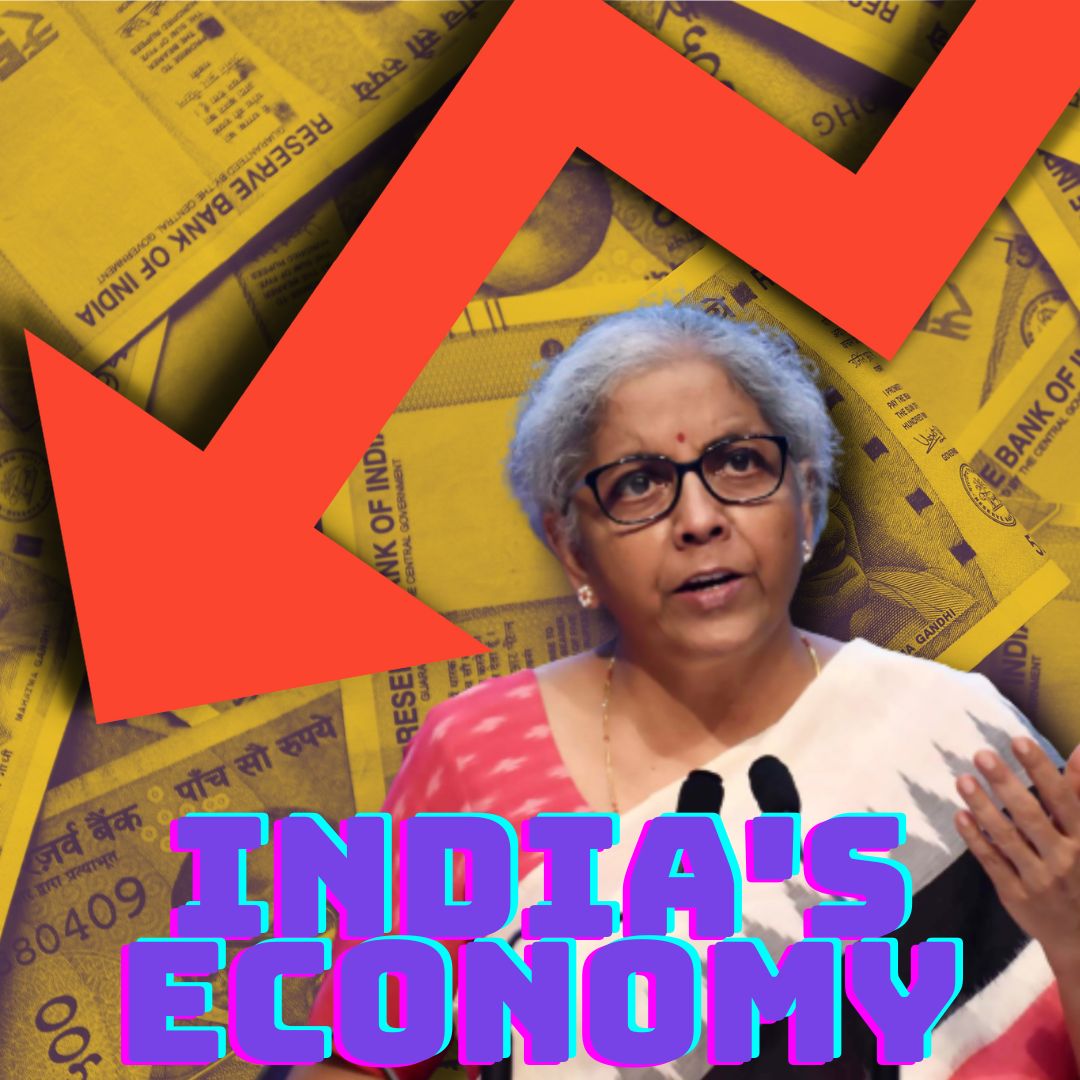India's Economy: Torn Between Chaos, Confusion And Control
India, 6 Jun 2022 7:15 AM GMT | Updated 6 Jun 2022 7:16 AM GMT
Creatives : Snehadri Sarkar |
While he is a massive sports fanatic, his interest also lies in mainstream news and nitpicking trending and less talked about everyday issues.
Guest Author : Joseph Rasquinha
He holds a PhD in Economics from St. Andrews University, Scotland, with 25 years of experience in India, China, Singapore, UAE, and the UK, with two books to his name.
The Indian economy today is a mixed bag. It alternates between Chaos, Confusion and Control. Chaos has always been there in the Indian economy. It is part of the very nature of India and its economic progress, its diverse populations, cultures, languages and customs.
India's economy is facing major challenges and stress in the post covid world. Although there are apologists of the economy that carp on its revival, and there are some improvements to the economy, the general consensus is that India's economy has not yet recovered to pre-covid levels. In fact, the RBI in a recent article stated that it could take India as long as 12 years to recover to its pre-covid levels of economic growth and stability. Combined with economic indicators that show unemployment at around 9 per, youth unemployment at over 30 per cent in some states, inflation on the rise, and a host of other factors, the short term prospects of the Indian economy (12 months) look bleak. Unfortunately, the middle term prospects (12-24 months ) look even bleaker.
The Indian economy today is a mixed bag. It alternates between Chaos, Confusion and Control. Chaos has always been there in the Indian economy. It is part of the very nature of India and its economic progress, its diverse populations, cultures, languages and customs. As Arundathi Roy says so aptly, "India lives in several centuries at the same time". Confusion and Control also have always been part of our ethos. However, in the mix of these three elements India's economy has actually shone over the centuries when Chaos was a major player and Controls of the economy were at minimalistic levels.
So Chaos with the least control is the best that has happened to the Indian economy in the past. If that surprises you, read on!
Why Chaos Is Good
Chaos in our economic activity has been India's strength. This is unique to India and India alone. Our entire industry, unorganised sector, and businesses work in an atmosphere of chaos that looks out of place in the rest of the world. Don't get me wrong, we are talking of chaos in the economy, not individuals or companies or organisations. They are well organised, but they all work in a chaotic atmosphere and that is India's actual success over centuries! As Sadhguru said, "India lives in organic chaos and that is its strength". But for those of you who are sceptical, India has always worked best among chaos! The growth of the Indian private sector has been totally independent of any control (apart from a few statutory ones) and at most times despite controls which have been archaic (like the outdated labour laws). And there is historical data for this.
Prior to British colonisation, India was the richest country in the world. The domineering factor was Chaos. And by chaos, I mean economic chaos. Everything was de-centralised. Every state, region, municipality and village had their own rules and economic activity at this level was totally different, even from small region to region. If you look at it from today's perspective, it was chaos with minimal central control apart from tax receipts and a few other areas. As long as rulers got their money, they didn't care about the actual systems in place. This was even the case with the great empires and dynasties from Shah Jahan, Akbar, the Gupta, and before. But it made us the richest country in the world and a place that European explorers dreamed of reaching. They even named countries after us (like the West Indies) when they landed in the wrong place.
This brings us to the point that for the economy, Chaos is good. Control is bad.
Why Control Is Bad
The problem with control is that it stifles innovativeness and growth to a large extent. In the 21st century, everyone accepts that some controls are important and cannot be compromised. But when it comes to the economy, you cannot control most aspects of it when it comes to most sectors and apart from regulatory and minimum compliances, most should be left free. But this is anathema to most Government and Statutory authorities. In spite of repeated examples of how controls have ruined economies worldwide and even created major inefficiencies in our system, they are still the favourite medium for most Governments.
If you look at India, 250 years of British colonisation with controls to prevent Indian industries from going forward made us from the richest to among the poorest in the world. After independence, the 5 year plans created an entire segment of inefficient public sector conglomerates that bled the economy. Bank nationalism led to enormous non-performing assets which are estimated at over 6 lakh crore, though no one really knows the exact number. Then at the beginning of the 21st century, the nature of controls changed. Demonetisation negatively impacted an enormous number of businesses, particularly in the unorganised sector which was dependent on cash, and was chaotic, but also provided huge opportunities to many.
GST is badly implemented and is creating confusion. And digital payments though convenient are costly. Compliances have become draconic and while compliance is important, they have to be suited to the Indian Psyche which responds well to carrot-based rather than stick based systems.
Initiatives like 'Make in India' seem to take a book out of how China which is a highly controlled economy has developed. China has transformed its industries amazingly and made a major impact on the world. But India and China are like the North and South Pole. The Chinese have a herd mentality. Indians are totally individualistic and have been so from the beginning. We cannot afford controls as our economy has grown the best during minimal controls and in chaos.
The growth of the software industry is one such example, in that it grew during a time that no control over it. Government authorities did not really know about software and they understood it much later on. The story goes that even a former Chief Minister in the 1990s had to be educated multiple times that computer hardware was not pipes and bolts. This was when the software was a billion-dollar business
Where We Stand Today
Covid has made everything different. From a social, employment, and general outlook it has severely impacted our economy. From the perspective of creating chaos, it has been the best thing that has happed for our businesses and the economy in general. Why?
The chaos that covid has created has informally removed a lot of the controls that have so restricted the economy. The problems faced by businesses and enterprises remain and have even multiplied. But our own history has taught us that most people, particularly in the informal and unorganised sector find the solutions. And they are the key. Our unorganised sector creates 60 per cent of the jobs. They create the entire framework we live on. This is particularly true in India as it is a service-based economy with over 52 per cent of services contributing to GDP. And services have grown without any controls despite the confusion about what policy should be made.
The effort for India to create a strong manufacturing base with initiatives like 'Make in India' is probably doomed from the start. India's manufacturing sector has declined from 23 per cent of GDP during independence to around 20 per cent today. In 75 years, if our ability to manufacture has declined, by what logic will it go up in the future? The future lies in services, but that is a chaotic area as the field is diverse with new offerings coming out regularly. But it is an area that is the future and which many do not like as controls and regulations are much harder due to greater international connectivity and the use of technology to create opportunities. The faster we accept Henry Adams said that "Chaos is a law of nature, Order is a dream of man", we will move forward much faster in our economy and at an individual level.
What Is The Future And How Does One Prepare For It
We can only look at a future timeline of around 24 months as that is all one can plan for. The challenges that the Indian economy will face will probably accelerate and it will be more and more chaotic as India and the rest of the world feel the effects of the recessions that the US and European countries seem to be heading for. The authorities will have their hands full to deal with social and political challenges. Statutory authorities will deal with inflation, interest rates, and so on. The rest will be chaos. And that is where the opportunity lies. Both for survival and Advancement
One of the most admired institutions in the Army because of their discipline and deservedly so. So let us take the example of another army, the German army in world war 2 that conquered almost the whole of Europe during a period of total chaos. They were disciplined, but so were other armies. They were able to make amazing progress because of a simple principle of "Auftragstaktik". Simply translated, this means fulfilling your objective without interference.
This allowed local commanders to make amazing gains. This continued for almost 3 years until Hitler made 'control' decisions of interfering in all plans personally. That was their end.
The principle of Auftragstaktik is great for our economy in the present covid times both from a macro and individualistic level. Slightly adapting it would be to fulfil one's objectives without bothering about interference. From an economic perspective, it could be the revival of the private sector that see opportunities in the chaos that covid has created. From an individualistic perspective, it could be the objective of keeping one in survival mode as you scout for the opportunity. But any which way, this Tharoor like word of Auftragstaktik is perhaps the only light in the tunnel we have as we grapple with the aftereffects of the pandemic.
Also Read: Police Brutality Caught On Camera! Swiggy Delivery Partner Slapped By Traffic Cop In Coimbatore
 All section
All section















